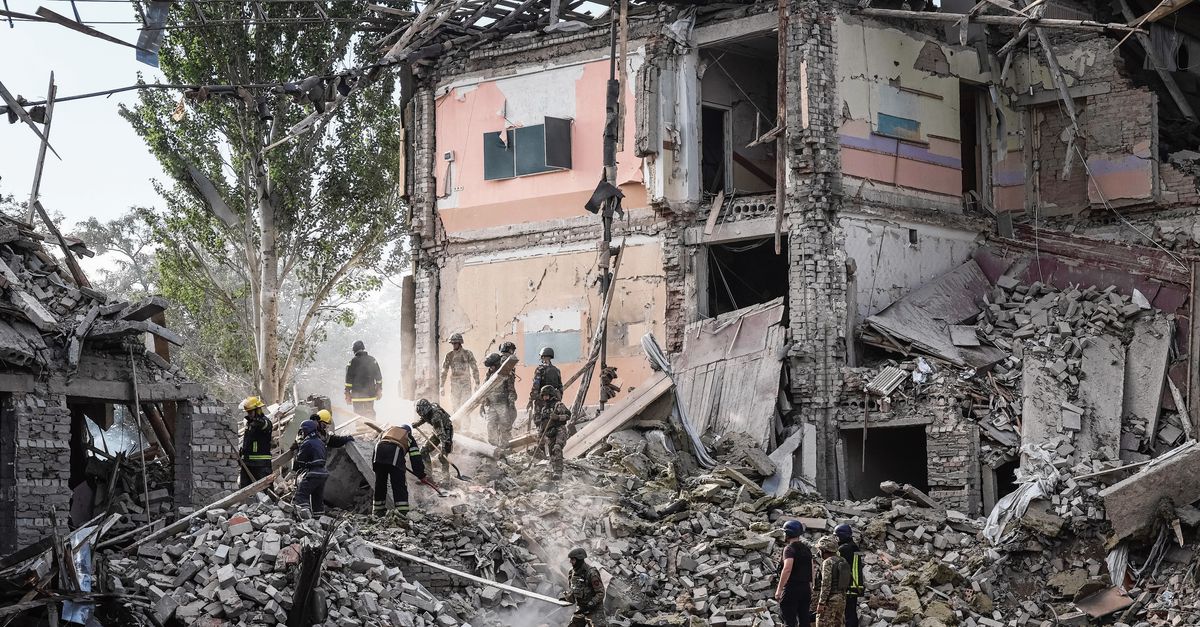Russian Foreign Minister Sergei Lavrov gave an interview to the RT propaganda channel last week when asked how Moscow’s war in Ukraine should end. “Geography,” RT Editor-in-Chief Margarita Simonjan stated.
“Geography is different now,” Lavrov said with a straight face. “We have long ceased to talk only about Donetsk and Luhansk: it concerns the Kherson region, the Zaporizhzhya region and a whole host of other regions.”
That was great. On February 24, the first day of the Russian invasion, Russian President Putin said that Moscow did not want to invade Ukraine, but rather wanted to “de-Nazify” – meaning that Putin was referring to the overthrow of Zelensky’s government. When the attack on Kyiv ended in a shameful defeat, the Kremlin suddenly announced that the war was about the “liberation” of eastern Donbass. Now, on the verge of flight, Lavrov formulated new war goals that amounted to the capture of a quarter of Ukraine’s territory. “The process unfolded step by step, but it is inevitable,” Lavrov said. Shipments of new Western weapons – such as the HIMARS missile launch system, with a greater range – will only fuel Russia’s hunger for land, according to the minister: “Then geographical targets will move away from the front line.”
It looked threatening and that was the goal, says Russian political scientist Valery Soloveg. According to Soloveg, the Kremlin would like to negotiate an honorable peace: no NATO membership for Ukraine and the annexation of the lands occupied by Russia. However, now that the influx of Western weapons has brought a new balance to the battlefield, Kyiv has little desire for it. “Ukraine does not want to meet the Russian demands,” says Soloveg. So Moscow resorts to threats: if you do not speak now, we will occupy more territory.
Hardliners and Realists
Five months later, Soloveg says, the war in Ukraine has entered a decisive phase, but behind the high walls of the Kremlin, there is confusion about which path to follow. A small but powerful group of militants wants to continue the Russian offensive until the entire Black Sea coast and eastern Ukraine are occupied. On the other hand, the vast majority of realists, both in the civil service and in the armed forces, believe that such a thing is no longer possible. Many soldiers believe that the situation may develop unfavorably for Russia if the West continues to support Ukraine on a large scale. In this case, there is a risk of losing the newly conquered lands. ”
Over the past three months, Russian forces have been slowly but surely advancing in the Donbass. The capture of Lyschansk early this month marked Russia’s “victory” after the painful withdrawal from northern Ukraine: the capture of the entire Luhansk province. Now, Moscow designated the Donetsk Province.
But is the Russian army still capable of that? According to the Ukrainian General Staff, approximately 40 thousand Russian soldiers were killed. CIA chief William Burns said this week that at least 15,000 Russians had been killed and 45,000 wounded.
packing
On Thursday, Canada’s Defense Ministry said, “Russia may no longer have the military capacity to achieve its goals.” According to former FSB officer Igor Girkin, Internet spokesperson for Russian nationalists, more soldiers are killed or released from service than new recruits. Russia cannot win the war only with professional soldiers, says Girkin: Russia must mobilize reservists and conscripts.
Solovig says the plans are ready. Last Friday, the Russian State Duma was suddenly recalled from recess. Until the last moment, it was not clear what parliamentarians should vote on, but according to Soloveg’s sources, far-reaching proposals were prepared, from declaring martial law in the Russian border regions to declaring (partial) mobilization.
Solovj says Putin gave up at the last minute. The Russian parliament eventually voted on its own to promote Russia’s Minister of Industry and Foreign Trade to Deputy Prime Minister.
Circumstances at the front should compel Moscow to make clear choices. Ukraine is preparing a counterattack on the southern city of Kherson. Putin must act this summer to confront them, or it will be too late. But Putin hesitates: calling up reservists and conscripts could lead to internal unrest. It’s not the only decision the Russian president is delaying. “Everyone who talks to him says he has stopped making decisions,” Soloveg says. He fell into a kind of administrative stalemate. He has all kinds of prepared decisions, but he does not make any decisions. This seems to have been going on for a month.”
A version of this article also appeared in The July 23, 2022 جريدة

“Infuriatingly humble social media buff. Twitter advocate. Writer. Internet nerd.”








